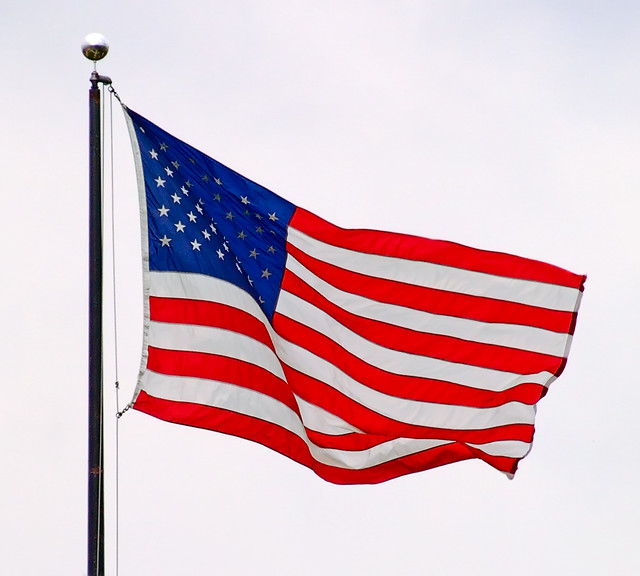OBERSERVATIONS ON the United States, from the famed English writer and Catholic convert
G.K. Chesterton (1874-1936), from his book
What I Saw in America (1922):
America is the only nation in the world that is founded on a creed. That creed is set forth with dogmatic and even theological lucidity in the Declaration of Independence; perhaps the only piece of practical politics that is also theoretical politics and also great literature. It enunciates that all men are equal in their claim to justice, that governments exist to give them that justice, and that their authority is for that reason just. It certainly does condemn anarchism, and it does also by inference condemn atheism, since it clearly names the Creator as the ultimate authority from whom these equal rights are derived. Nobody expects a modern political system to proceed logically in the application of such dogmas, and in the matter of God and Government it is naturally God whose claim is taken more lightly. The point is that there is a creed, if not about divine, at least about human things.

But citizenship is still the American ideal; there is an army of actualities opposed to that ideal; but there is no ideal opposed to that ideal. American plutocracy has never got itself respected like English aristocracy. Citizenship is the American ideal; and it has never been the English ideal. But it is surely an ideal that may stir some imaginative generosity and respect in an Englishman, if he will condescend to be also a man...
But the point is not that nothing exists in America except this idea; it is that nothing like this idea exists anywhere except in America. This idea is not internationalism; on the contrary it is decidedly nationalism. The Americans are very patriotic, and wish to make their new citizens patriotic Americans. But it is the idea of making a new nation literally out of any old nation that comes along. In a word, what is unique is not America but what is called Americanisation. We understand nothing till we understand the amazing ambition to Americanise the Kamskatkan and the Hairy Ainu. We are not trying to Anglicise thousands of French cooks or Italian organ-grinders. France is not trying to Gallicise thousands of English trippers or German prisoners of war. America is the one place in the world where this process, healthy or unhealthy, possible or impossible, is going on. And the process, as I have pointed out, is not internationalisation. It would be truer to say it is the nationalisation of the internationalised. It is making a home out of vagabonds and a nation out of exiles...
Chesterton, however, saw that the United States in his age was already corrupted:
But when I say that the Republic of the Age of Reason is now a ruin, I should rather say that at its best it is a ruin. At its worst it has collapsed into a death-trap or is rotting like a dunghill. What is the real Republic of our day as distinct from the ideal Republic of our fathers, but a heap of corrupt capitalism crawling with worms; with those parasites, the professional politicians? I was re-reading Swinburne's bitter but not ignoble poem, 'Before a Crucifix,' in which he bids Christ, or the ecclesiastical image of Christ, stand out of the way of the onward march of a political idealism represented by United Italy or the French Republic. I was struck by the strange and ironic exactitude with which every taunt he flings at the degradation of the old divine ideal would now fit the degradation of his own human ideal. The time has already come when we can ask his Goddess of Liberty, as represented by the actual Liberals, 'Have you filled full men's starved-out souls; have you brought freedom on the earth?' For every engine in which these old free-thinkers firmly and confidently trusted has itself become an engine of oppression and even of class oppression. Its free parliament has become an oligarchy. Its free press has become a monopoly. If the pure Church has been corrupted in the course of two thousand years, what about the pure Republic that has rotted into a filthy plutocracy in less than a hundred?
O, hidden face of man, whereover
The years have woven a viewless veil,
If thou wert verily man's lover
What did thy love or blood avail?
Thy blood the priests make poison of;
And in gold shekels coin thy love.
Which has most to do with shekels to-day, the priests or the politicians? Can we say in any special sense nowadays that clergymen, as such, make a poison out of the blood of the martyrs? Can we say it in anything like the real sense, in which we do say that yellow journalists make a poison out of the blood of the soldiers?
But I understand how Swinburne felt when confronted by the image of the carven Christ, and, perplexed by the contrast between its claims and its consequences, he said his strange farewell to it, hastily indeed, but not without regret, not even really without respect. I felt the same myself when I looked for the last time on the Statue of Liberty....



No comments:
Post a Comment